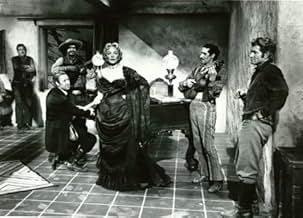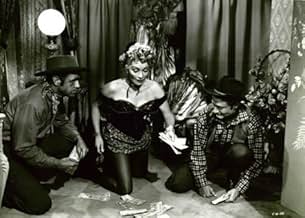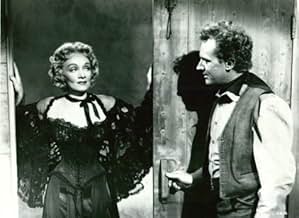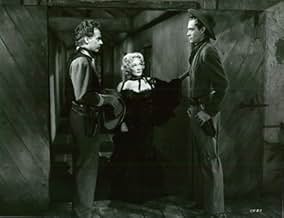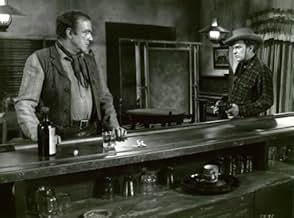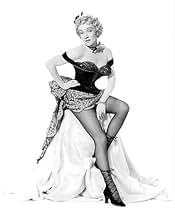IMDb रेटिंग
6.8/10
5.9 हज़ार
आपकी रेटिंग
अपनी भाषा में प्लॉट जोड़ेंAfter the murder of his fiancée, a Wyoming ranch hand sets out to find her killer.After the murder of his fiancée, a Wyoming ranch hand sets out to find her killer.After the murder of his fiancée, a Wyoming ranch hand sets out to find her killer.
Rodd Redwing
- Rio
- (as Rodric Redwing)
Victor Adamson
- Racer with Fat Girl
- (बिना क्रेडिट के)
Roger Anderson
- Red
- (बिना क्रेडिट के)
Al Bain
- Race Spectator
- (बिना क्रेडिट के)
Ray Beltram
- Barfly
- (बिना क्रेडिट के)
फ़ीचर्ड समीक्षाएं
I'm not a Marlene Dietrich fan and don't really see Arthur Kennedy as being charismatic enough to interest her, and am not usually keen on background ballads, but I enjoyed this film from beginning to end.
Director Fritz Lang keeps the pace lively and brightens up the generally sombre mood with a couple of light-hearted sequences - first the "horse-race" with saloon girls riding cowboys and then the crooked politicians awaiting their fate in gaol.
"Variety" Film Guide calls the plot "corny", but it's no more so than many other films of the 1950s, or indeed of any other decade, and it's different to most Westerns of the period. And for those times it's also relatively direct in its treatment of sex; we are left in no doubt that Kennedy's fiancée has been raped and that the man Kennedy suspects of the assault is obviously out for what he can get from women.
One is not told how Kennedy acquires his gun-fighting skills - at the beginning a posse member points out his lack of these. The only weakness are a couple of "outdoor" scenes obviously filmed in the studio, where the rock formations are eye-catchingly unrealistic.
The acting is generally good, with Kennedy doing well as the grief- stricken hero seeking revenge and Mel Ferrer showing screen-presence as the slightly sinister and somewhat sensitive fast gun.
Director Fritz Lang keeps the pace lively and brightens up the generally sombre mood with a couple of light-hearted sequences - first the "horse-race" with saloon girls riding cowboys and then the crooked politicians awaiting their fate in gaol.
"Variety" Film Guide calls the plot "corny", but it's no more so than many other films of the 1950s, or indeed of any other decade, and it's different to most Westerns of the period. And for those times it's also relatively direct in its treatment of sex; we are left in no doubt that Kennedy's fiancée has been raped and that the man Kennedy suspects of the assault is obviously out for what he can get from women.
One is not told how Kennedy acquires his gun-fighting skills - at the beginning a posse member points out his lack of these. The only weakness are a couple of "outdoor" scenes obviously filmed in the studio, where the rock formations are eye-catchingly unrealistic.
The acting is generally good, with Kennedy doing well as the grief- stricken hero seeking revenge and Mel Ferrer showing screen-presence as the slightly sinister and somewhat sensitive fast gun.
First of all, the word "noir" is thrown around much too carelessly, so let's be clear: This is a Western. Pure and simple. In fact it's a pretty bad Western, really, but somehow it manages to be a lot of fun. You've got Marlene Dietrich a little past her prime with plucked and painted eyebrows that leave her facial expression in a perpetual state of surprise. There's a gunslinger named "Frenchy Fairmont," and a warbly sung narrative song throughout reminding us that this is a tale of murder and revenge. I especially liked the line (I don't remember it exactly) spoken by a doctor who rattles off a list of a cowboy's injuries and sums up by saying, "So, really, he's pretty dead."
"Rancho Notorious" isn't one of the genre's better entries, but see it some time just for its entertainment value.
"Rancho Notorious" isn't one of the genre's better entries, but see it some time just for its entertainment value.
Chuck-a-Luck is a hole in the wall type ranch where men with prices on their heads hide out and are given protection by Altar Keane (Marlene Dietrich) and her lover Frenchy Fairmont (Mel Ferrer) for ten percent of the loot brought in my the outlaws. Chuck-a-Luck is called Rancho Notorious in the film's title, which does sound somewhat better. Unfortunately a terrible narrative theme, "The Legend of Chuck-a-Luck" used throughout the movie becomes very grating to the ears. The ballad singer William Lee (who is he anyway?) doesn't help the situation. Fortunately the songs chosen for the talented Marlene Dietrich to perform are much better (actually one "Gypsy Davey" is an old British ballad that Woody Guthrie turned into a cowboy song). Her renditions are not quite on the level of her "See What The Boys In The Backroom Will Have" from the western classic "Destry Rides Again" but are still captivating. (Interesting that she played a saloon girl named Frenchy in "Destry" whereas this time her lover is named Frenchy.)
This is one of few so-called adult westerns from the 1950's that actually lives up to that label. The flashback barroom scene where the soiled angels are riding their customers in a drunken mock horse race as jockeys would ride horses shows how fun and games in Old West saloons really took place. The whores are not prima donnas as oft times shown in Hollywood films. Pay particular attention to the gross fat showgirl trying to ride a much smaller client. It is funny and repulsive at the same time. Fritz Lang takes away all window dressing. Even Marlene Dietrich looks much more slutty and rough around the edges than she did in "Destry." Being over a decade older gives even more authenticity to Dietrich's character. She looks like a much older Lola Lola from "Blue Angel."
Mel Ferrer is an actor with a somewhat limited range. In the right role he could shine. His best acting was done in a movie that came out just before this one, "The Brave Bulls." But his second best role is as Frenchy in "Rancho Notorious." He fits his part much better than Arthur Kennedy fits his. Kennedy as a gunslinging rancher is fine but Kennedy the lover takes a suspension of belief, especially as Marlene Dietrich's lover. One can just imagine how he would look in the morning after one night with Altar Keane.
Fritz Lang's direction is spectacular. He captures all the nuances of the characters. His flashback technique at the first of the movie to define Altar Keane's persona is reminiscent of Orson Welles' milestone direction of "Citizen Kane." Then he progresses to an almost film noir western in color. The cinematography is much better in some parts of the film. It is not as effective when Frenchy and Vern (Arthur Kennedy) are together in the hills (the background sometimes looks phony) than when interior sets are used. Perhaps this relates to a money problem producing the show.
Another enjoyable facet of the feature is the gallery of colorful character actors who all do superlative jobs. George Reeves (tv's Superman) is lovingly menacing as a womanizing gun toting ambusher. Jack Elam is fine as a distrustful negative thinking thief. Frank Ferguson plays the outlaw called Preacher who prays and reads from the Bible for special guidance in robbing and killing. William Frawley (better known as Fred Mertz) shows a mean side playing a double dealing saloon gambler who fires Altar. Fuzzy Knight is an honest barber who tries to help Vern out of a mess. This time he doesn't stutter. Several other notables such as Tom London, Kermit Maynard, and Harry Woods have interesting bit parts.
If Lang could have borrowed Tex Ritter from High Noon to do an appropriate theme, "Rancho Notorious" would have been a winner all the way.
This is one of few so-called adult westerns from the 1950's that actually lives up to that label. The flashback barroom scene where the soiled angels are riding their customers in a drunken mock horse race as jockeys would ride horses shows how fun and games in Old West saloons really took place. The whores are not prima donnas as oft times shown in Hollywood films. Pay particular attention to the gross fat showgirl trying to ride a much smaller client. It is funny and repulsive at the same time. Fritz Lang takes away all window dressing. Even Marlene Dietrich looks much more slutty and rough around the edges than she did in "Destry." Being over a decade older gives even more authenticity to Dietrich's character. She looks like a much older Lola Lola from "Blue Angel."
Mel Ferrer is an actor with a somewhat limited range. In the right role he could shine. His best acting was done in a movie that came out just before this one, "The Brave Bulls." But his second best role is as Frenchy in "Rancho Notorious." He fits his part much better than Arthur Kennedy fits his. Kennedy as a gunslinging rancher is fine but Kennedy the lover takes a suspension of belief, especially as Marlene Dietrich's lover. One can just imagine how he would look in the morning after one night with Altar Keane.
Fritz Lang's direction is spectacular. He captures all the nuances of the characters. His flashback technique at the first of the movie to define Altar Keane's persona is reminiscent of Orson Welles' milestone direction of "Citizen Kane." Then he progresses to an almost film noir western in color. The cinematography is much better in some parts of the film. It is not as effective when Frenchy and Vern (Arthur Kennedy) are together in the hills (the background sometimes looks phony) than when interior sets are used. Perhaps this relates to a money problem producing the show.
Another enjoyable facet of the feature is the gallery of colorful character actors who all do superlative jobs. George Reeves (tv's Superman) is lovingly menacing as a womanizing gun toting ambusher. Jack Elam is fine as a distrustful negative thinking thief. Frank Ferguson plays the outlaw called Preacher who prays and reads from the Bible for special guidance in robbing and killing. William Frawley (better known as Fred Mertz) shows a mean side playing a double dealing saloon gambler who fires Altar. Fuzzy Knight is an honest barber who tries to help Vern out of a mess. This time he doesn't stutter. Several other notables such as Tom London, Kermit Maynard, and Harry Woods have interesting bit parts.
If Lang could have borrowed Tex Ritter from High Noon to do an appropriate theme, "Rancho Notorious" would have been a winner all the way.
The Western is so unique, so internalised, and so full of instantly-recognisable motifs, that many Westerns from the classic era take on the look and feel not of the western United States, but some surreal and separate country, as far removed from America as anywhere else. This was especially the case when the increasingly European production crews in Hollywood produced their skewed yet affectionate takes on this "most American of genres".
Rancho Notorious at first comes across as a "noir" Western, at least if one looks at the Sylvia Richards story and Daniel Taradash screenplay, but it's much more than that. Director Fritz Lang probably had much less to do with the screenplay than is sometimes claimed (he was never a particularly great writer, even in his native German), but he has a whole lot to do with the tone of the picture. Far from turning this into an anti-western, he makes use of sweeping landscapes, rough-looking saloons and typical cowboy business, the sort of thing some revisionist filmmakers eschewed, but they are all given that typical Lang look of zigzagging paths and stark diagonal lines. He also injects that stylised rhythmic feel that harks back to his silent pictures or the bizarre semi-musical gangster movie You and Me (1938). A montage of gritty faces underscores a few of the songs, while a mysterious puff of smoke drifts onto the screen as Marlene Dietrich decides whether or not to gamble the last of her money. The impression is of a Western full of exaggerated cliché, and yet totally remote from the cosy cowboy flick.
The second crucial figure in Rancho Notorious is the other German émigré, Fraulein Dietrich. Although Dietrich is not really known as a Western star, her only other appearance in the genre being Destry Rides Again in 1939, her character in Rancho Notorious seems to be a play upon her old screen persona. It seems to chime particularly true with her real career trajectory that everyone remembers Altar Keane's name, a few have some sordid stories about her, but no-one seems to know quite what has happened to her now. Dietrich plays the part sublimely, conjuring up some of her old magic, tinged with the weariness of middle-age. Her best moments are in the series of flashbacks in which her character is introduced – her gleeful cheating in the "horse" race scene, or the disdainfulness with which she brushes off a would-be admirer in the gambling joint. She has the air of someone who has been round the block a bit, and yet makes it eminently clear why men still love her and fight over her. The very worthy Arthur Kennedy is ostensibly the lead player, although it is appropriate he is billed below Dietrich not just because she was a bigger star, but because she really is the heart of this movie.
Rancho Notorious is rather a cheap and cheerful offering, with the all the production values of the trashy B-Westerns that this era was full of. And yet it has something that even some of the most prestigious and professional pictures do not. Everyone involved seems to have been working on the same wavelength. There is the stripped-down production design of Wiard Ihnen and washed out Hal Mohr cinematography, which help to give it this bleak, distant imagery. Then there's the casting in smaller roles, stereotypically Western yet almost comically over-the-top, like the coroner who pronounces a man "reeeaal dead", or the moustachioed old-timer who imagines the ranch as some sort of romantic hideaway. And finally those haunting and twisted takes on the cowboy ballads penned by Ken Darby. Together they create a compelling view of the west, not as it really was, but as it has been imagined – in this instance, a dream of the Old West a few shades away from a nightmare.
Rancho Notorious at first comes across as a "noir" Western, at least if one looks at the Sylvia Richards story and Daniel Taradash screenplay, but it's much more than that. Director Fritz Lang probably had much less to do with the screenplay than is sometimes claimed (he was never a particularly great writer, even in his native German), but he has a whole lot to do with the tone of the picture. Far from turning this into an anti-western, he makes use of sweeping landscapes, rough-looking saloons and typical cowboy business, the sort of thing some revisionist filmmakers eschewed, but they are all given that typical Lang look of zigzagging paths and stark diagonal lines. He also injects that stylised rhythmic feel that harks back to his silent pictures or the bizarre semi-musical gangster movie You and Me (1938). A montage of gritty faces underscores a few of the songs, while a mysterious puff of smoke drifts onto the screen as Marlene Dietrich decides whether or not to gamble the last of her money. The impression is of a Western full of exaggerated cliché, and yet totally remote from the cosy cowboy flick.
The second crucial figure in Rancho Notorious is the other German émigré, Fraulein Dietrich. Although Dietrich is not really known as a Western star, her only other appearance in the genre being Destry Rides Again in 1939, her character in Rancho Notorious seems to be a play upon her old screen persona. It seems to chime particularly true with her real career trajectory that everyone remembers Altar Keane's name, a few have some sordid stories about her, but no-one seems to know quite what has happened to her now. Dietrich plays the part sublimely, conjuring up some of her old magic, tinged with the weariness of middle-age. Her best moments are in the series of flashbacks in which her character is introduced – her gleeful cheating in the "horse" race scene, or the disdainfulness with which she brushes off a would-be admirer in the gambling joint. She has the air of someone who has been round the block a bit, and yet makes it eminently clear why men still love her and fight over her. The very worthy Arthur Kennedy is ostensibly the lead player, although it is appropriate he is billed below Dietrich not just because she was a bigger star, but because she really is the heart of this movie.
Rancho Notorious is rather a cheap and cheerful offering, with the all the production values of the trashy B-Westerns that this era was full of. And yet it has something that even some of the most prestigious and professional pictures do not. Everyone involved seems to have been working on the same wavelength. There is the stripped-down production design of Wiard Ihnen and washed out Hal Mohr cinematography, which help to give it this bleak, distant imagery. Then there's the casting in smaller roles, stereotypically Western yet almost comically over-the-top, like the coroner who pronounces a man "reeeaal dead", or the moustachioed old-timer who imagines the ranch as some sort of romantic hideaway. And finally those haunting and twisted takes on the cowboy ballads penned by Ken Darby. Together they create a compelling view of the west, not as it really was, but as it has been imagined – in this instance, a dream of the Old West a few shades away from a nightmare.
I've heard RN called underrated and under appreciated and I can see why. It's not the best or perfect but it's different from most. The story is lean but heavy in undertones and gives it weight and moves along well.
क्या आपको पता है
- ट्रिवियाCinematographer Hal Mohr, who had previously photographed Marlene Dietrich in Destry Rides Again (1939), attempted to resign from the film because of 50-year-old Dietrich's insistence that he use lighting to make her look much younger than she actually was, and Mohr didn't think it was possible.
- गूफ़When Haskell and Fairmont are in the cell and talking about gambling, one of them refers to a Chuck-a-Luck "Wheel". There is no wheel in Chuck-a-Luck. Chuck-a-Luck is a dice game played with (two or) three dice often contained in an hour-glass shaped rotatable cage. Bets are placed as to what number will come up on gaming table. The game played in the film involves a wheel with pegs in between representations of all the possible 3-dice rolls, which is the wheel that is both talked and sung about. This is a variation on the original game called Big Six Wheel. Because of the distribution of the combinations, the house advantage or edge for this wheel is greater than for Chuck-a-Luck.
- भाव
Altar Keane: [to Vern] I'd wish you go away... and come back ten years ago.
- क्रेज़ी क्रेडिटAs the title song plays and Bill Lee sings the lyric "... and a man of steel ..." there are eleven names of supporting actors on screen, and the name in the central position is George Reeves, soon to be cast as The Man of Steel in *The Adventures of Superman* (1952-58).
- कनेक्शनEdited into Histoire(s) du cinéma: Fatale beauté (1994)
टॉप पसंद
रेटिंग देने के लिए साइन-इन करें और वैयक्तिकृत सुझावों के लिए वॉचलिस्ट करें
- How long is Rancho Notorious?Alexa द्वारा संचालित
विवरण
- रिलीज़ की तारीख़
- कंट्री ऑफ़ ओरिजिन
- भाषा
- इस रूप में भी जाना जाता है
- El refugio
- फ़िल्माने की जगहें
- उत्पादन कंपनी
- IMDbPro पर और कंपनी क्रेडिट देखें
बॉक्स ऑफ़िस
- बजट
- $9,00,000(अनुमानित)
- दुनिया भर में सकल
- $63
- चलने की अवधि
- 1 घं 29 मि(89 min)
- रंग
- पक्ष अनुपात
- 1.37 : 1
इस पेज में योगदान दें
किसी बदलाव का सुझाव दें या अनुपलब्ध कॉन्टेंट जोड़ें

